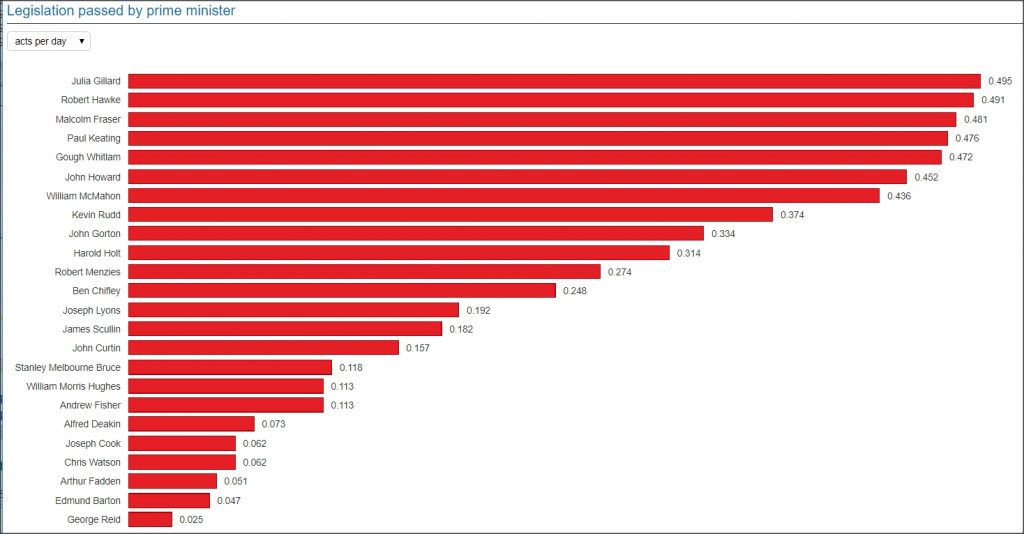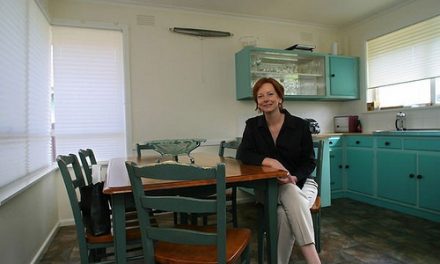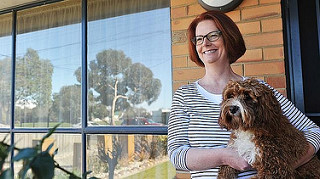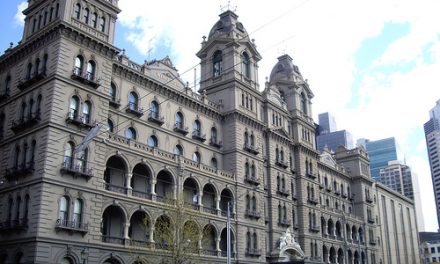The nation was gripped with political tension, plotting, undermining and poll fever for the past three years. The drama started on 24 June 2010 when Julia Gillard became the 27th Prime Minister of Australia and its first female PM after Kevin Rudd was “knifed by faceless men” from the caucus of the Australian Labor Party. The manner she was brought to power has led to unceasing questioning of the legitimacy of her governance by the electorate as well as planting the seeds for divisions within the party. On 26 June 2013, the political career of Australia’s first female PM was cut short after she was defeated (45 to 57 votes) by Kevin Rudd in a leadership spill.
Julia Gillard has suffered the most disrespect and verbal abuse from her opponents, media and segments of the population never accorded to a previous Prime Minister. However, even her fiercest critics have acknowledged her immense strength, tenacity, toughness, steely determination and courage, which most men would have paled in comparison.
She can count among her achievements the following (which includes a number of firsts):
-
- The pioneering status as the first female PM – a distinction forever hers. She pointed out in her concession speech that this will make it easier for future generations of female PMs.
- Passing of 532 legislation by both houses where every piece of legislation needed to be painstakingly negotiated in a hung Parliament (Ref 1). A computation by the U.K. Guardian shows that Julia Gillard has achieved the highest rate in passing legislation at a rate of 0.495 legislation per day followed by Bob Hawke at 0.491 and Malcolm Fraser at 0.481 (Ref 2). The Guardian has created a dynamic chart where you can embed on your website. This chart which is hosted on a http site cannot be embedded in this https site, unlike my old Beautiful Altona blogspot site. Hence, I will provide an image instead.

- DisabilityCare, previously known as the National Disability Insurance Scheme (NDIS).
- Gonski educational reforms which aim to distribute funding more fairly to needy students (the Senate had passed the legislation on the same day Julia Gillard was ousted and the Rudd government still needs to negotiate with the remaining states yet to sign up).
- Educational reforms such as the first national school curriculum since federation, the first national teaching standards, the introduction of transparency through NAPLAN and MySchool website, etc (Ref 3,4).
- Australia’s first serious action to tackling climate change through introducing the Carbon Pricing Scheme (Carbon Tax), transiting to an Emissions Trading Scheme in 2015-16.
- National Broadband Network (NBN) – which runs into various implementation problems including massive delays in its roll out. The Coalition proposes a cheaper but slower NBN (Ref 5).
- World’s first Plain Cigarette Packaging Legislation – driven by Australia’s first female Attorney-General Nicola Roxon (Ref 6).
- Royal Commission into Institutional Responses to Child Sexual Abuse
- Formal annual meetings between China’s Premier and Australia’s PM – an arrangement that China accords to only a handful of countries which include Britain, Germany, Russia as well as the European Union (Ref 7, 8, 9).
- Australia became the third country after the US and Japan to secure a Direct Currency Trading Agreement with China (Ref 10, 11, 12, 13).
- Strengthened relationships with the United States and India.
- Winning a seat on the United Nations Security Council as a non-permanent member (Ref 14).
- Fair Work Act
- A $20 billion health reform agreement with the states – a watered-down version of Rudd’s vision (Ref 15).
- Minerals Resource Rent Tax – which greatly underdelivers by collecting negligible revenues so far – a consequence of both the collapsing iron and coal prices as well as its compromised, deeply-flawed design for getting the support of the three largest miners.
- Murray-Darling Basin Plan
- Passing of the historic Tasmanian Forests Intergovernmental Agreement and expansion of the existing UNESCO-listed Tasmanian Wilderness World Heritage Area to include forests of the Weld, Styx, Florentine and Great Western Tiers after more than 30 years of campaigning (Ref 16, 17, 18, 19, 20, 21).
As you can see, Julia Gillard has left behind a rich legacy of concrete accomplishments, some of which are her own ideas, some of which are compromised versions of Rudd’s visions and some which are forced upon her (Ref 22). In fact, Bill Shorten justified his critical defection from Gillard at the 11th hour on the grounds that Labor stands the best chance of defending the “Gillard legacy” under Rudd’s leadership (Ref 23, 24).
Reuters may have summed it up best when it said that “while Gillard was liked least by those furthest from her office – voters – Rudd is liked best by those who have never had to work with him.” (Ref 25). Hence lies the greatest irony of why Julia Gillard is so unpopular with the voters. Commentators have offered various reasons to explain her failings:
- The electorate has never forgiven her role in toppling a popularly-elected Prime Minister.
- Internal divisions, disunity and infighting within the Labor Party.
- Having to deal with two opponents – Tony Abbott (in the open) and Kevin Rudd (in the dark).
- Unrelenting negativity from the Opposition.
- 24/7 news cycle and over-dependence on opinion polls for policy directions.
- Breaking of promises such as the election promise not to introduce a Carbon Tax and the repeated promise to return the budget to surplus.
- Price paid for forming a minority government and later sacrificing integrity to ensure survival of the government:
- The government has become more inclusive by being more consultative with the Greens and independents. But it has also become beholden to the demands made by its minority partners e.g. acceding to the Greens’ demand for a Carbon Tax and thereby breaking a key election promise.
- Recruiting the Liberal turncoat Peter Slipper as the Speaker despite his dubious records.
- Defending the scandalous Craig Thomson.
- A number of policy blunders e.g. overturning of the Malaysian Refugee Swap Deal by the High Court, backflip on the asylum seekers policies, a poorly-designed Mining Tax, etc.
- Flawed political judgement and election strategies e.g. announcing the election date too early, using the gender card, class warfare, controversy in parachuting former Olympian Nova Peris into Parliament, etc.
- Discrimination towards women, particularly those in high office. In her concession speech, Julia Gillard said her gender “doesn’t explain everything, it doesn’t explain nothing, it explains some things. And it is for the nation to think in a sophisticated way about those shades of grey.”
- Accused of spin-doctoring and backfiring of the Real Julia strategy.
- Ineffective communication of the government’s achievements and visions.
- Failure to gain the support of businesses.
- Voters not buying that the economy is good.
- Policy stalemate caused by a culture of entitlement and vocal interest groups.
- External factors that are beyond the control of the government:
- Collapsing iron and coal prices leading to a much lower than forecasted revenue from the Mining Tax and creation of a budget black hole.
- Collapse of the carbon market in Europe, making the carbon price in Australia unsustainable.
- Climate of global economic difficulties.
- Impending end of the mining boom, brought about by structural changes in China’s economy.
- Persistently overvalued Australian dollar, hurting competitiveness of Australian manufacturing and other industries.
Historical Judgement
Amidst the sea of criticisms in the media, there are actually a handful of commentators who have kinder words for her. Some had started to write her political epitaphs even before she was deposed as the leader.
Paul Strangio, an Associate Professor of Politics at Monash University believes that history will treat Julia Gillard with more sympathy than her legion of contemporary detractors. In 2010, the Politics Department at Monash University conducted a large-scale study of about 40 surveys asking leading historians and political scientists to rate the prime ministers of Australia. Strangio said that the rankings suggest that longevity in office and electoral popularity is not an automatic passport to a high standing. Rather what matter most to prime ministerial reputation are policy footprints such as the first serious response to climate change, Disability Care, NBN and the Gonski reforms that have the makings of a substantial legacy. Reputations take time to settle after a leader leaves office: passions cool and perspective is gained. Posterity will better judge the significance of her reforms and weight it against her incapacity to parlay the measures into electoral favour (Ref 26, 27).
Martin Flanagan, a senior writer at The Age has this to say:
“Once her political defeat is complete, her fortunes will turn…. Julia’s exit from our collective psyche…will mark a new trajectory. Politicians such as Christopher Pyne come and go…. Gillard will not be forgotten…. People will return to her story again and again, even after she is dead, and, when they do, Howard Sattler and the Liberal fund-raiser menu will return to view and, with the passage of time, they will look even ruder, meaner and uglier… Other things will also become clearer…. Those who railed most loudly against her – the likes of Andrew Bolt and Alan Jones – will be seen to have histories of manipulating popular prejudice…. With the advantage of distance and cooler emotions, historians will ask such questions as: why was Gillard never able to overcome what she did to Kevin Rudd when Bob Hawke was able to overcome what he did to Bill Hayden?” (Ref 28)
Nicholas Reece who worked in Julia Gillard’s office from 2010 to 2012 has a lot of praises for her in the following article:
“To those who knew her at a personal level, as I did, she was regarded as warm, good-humoured, dignified, hard-working and courageous… There was courtesy shown to staff, MPs, public servants and stakeholders – every person entitled to a view was given a chance to express it before a decision was made. Gillard would diligently work her way through the detail of an issue and then patiently execute an agreed plan to tackle it. She was generous with her time and did not rush people in the way busy leaders often do. She was never rude and never raised her voice, unless for humorous purposes… She was a genuinely affectionate person and had a quick wit that could be deployed to lift the spirits of those around her. At her instigation, birthdays were the subject of office celebration. This would involve Gillard turning up for cake and delivering a very personal speech to even the most junior staff…. In a crisis, she was supremely calm. While others wilted, Gillard had a resilience that allowed her to keep stepping up to the plate. She was good at remembering people’s names, knowing their story, understanding their motivations and being able to see a situation from another’s perspective…. “
What will she do next?
At just 51 years old, it is too young for her to retire. Jacqueline Kent, author of Julia Gillard’s biography “The Making of Julia Gillard” said the former Prime Minister was likely to use the skills she gained in politics in a socially responsible way (Ref 29).
“She’s not particularly status conscious. That’s one of the nice things about her. I mean she has a very good sense of who she is but she is not chasing a title.“
She thinks Julia Gillard won’t be chasing ambassadorial or corporate roles like many former politicians do.
“I could see her working for some NGO, possibly in the area of education. That’s where her heart lies.“
I agree with former Labor strategist Adam Kilgour that Julia Gillard will have a significant career ahead. She could contribute her skills in so many roles, for example, as a:
- patron/director of Non-Governmental Organizations (NGOs)
- advocate for women, education and other social causes
- political or motivational speaker
- ambassador/diplomat
- political advisor/negotiator
- writer
- corporate role
I will actually like to see her conclude her signature and most important work – the Gonski educational reforms but that is not possible now. A lesson I have learnt from the comeback of Kevin Rudd is that everything is possible. There are many artistes who had publicly announced their retirements but later returned to the entertainment industry. In recent Australian politics, Bob Carr resigned as the Premier of NSW and retired from state politics in 2005. He was called back by Julia Gillard in 2012 to become the Minister for Foreign Affairs following the resignation of Kevin Rudd. When Nicola Roxon resigned earlier this year, there have been calls to ask the former Victorian Premier Steve Bracks to run for the Federal Seat of Gellibrand she is vacating. Hence, we cannot rule out any circumstances that will herald her return to politics in the future. It is still fresh in our minds that PM Kevin Rudd has said before he will not return to the leadership under any circumstances.
As an Altona resident, I will like to welcome her back to her home suburb and hope that I will have the opportunity to say hello to her, since she would have more time at home now. She probably has not taken a break for many years and now is the opportunity for her to enjoy the beauty of Altona leisurely!





Great article Anthony. Thanks. Another reason for her unpopularity was the relentless hounding by commercial, mainstream media controlled by the wealthy minority. e.g. Gina Rinehart and Rupert Murdoch. They stood to lose wealth that would have been shared by the majority of Australians through such policies as the mining tax. Generally the media was extremely biased, rude and disrespectful. The truth was pushed far the to the edges and politics became more like a reality TV show where people were manipulated by the media in an inane, prejudiced, popularity contest.
I enjoyed reading your article, even though l was not a fan of Juliar Gillard. I must say l do feel sympathy for the way she was dumped, but then again she was willing to take over when Rudd was dumped in similar fashion. As for highest rate of legislation, that ain't always a good thing. Poor legislation is bad legislation and lets not forget how many failed policies they introduced, maybe that was because too much was rushed and not thought out well enough. Mining tax is a prime example….. legislation which introduced a tax that brought in next to no revenue.
Glad she is gone, but K.Rudd is potentially poor of a problem second time round.
julia has sold up her altona home and returned to adelaide. great sense of community.